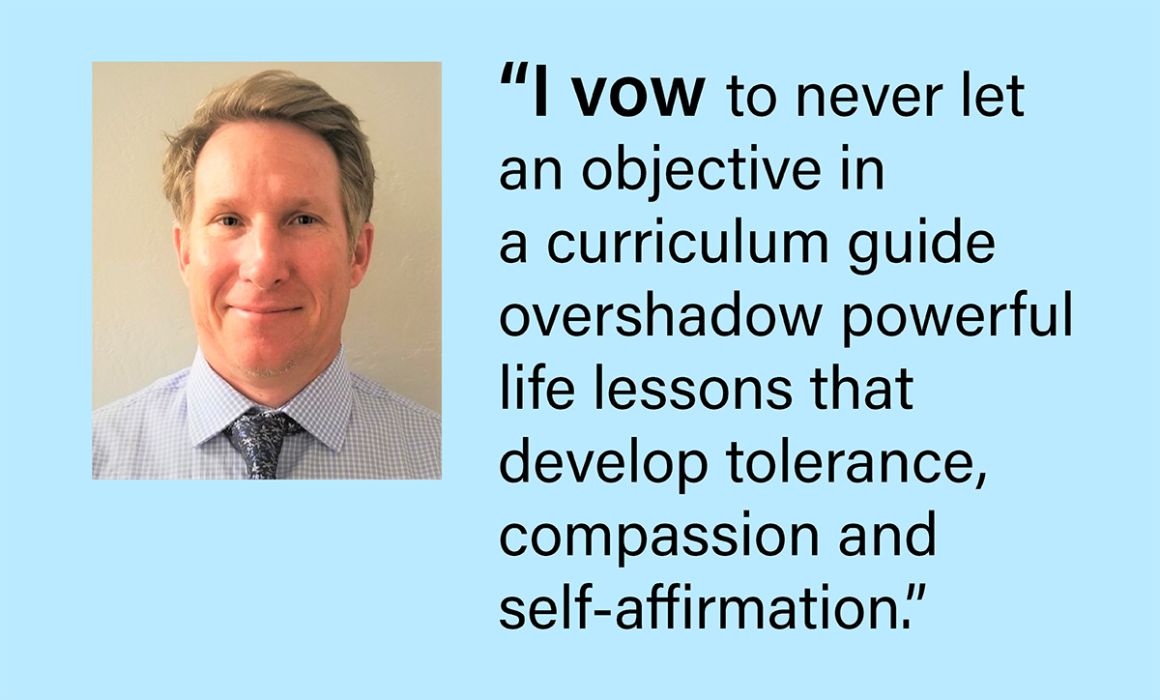
In March of this year (2021), I watched as a student’s beloved grandfather had a stroke — via Zoom. It was beyond frustrating to know there was so little I could do for him, and the event was not only traumatic for my student, but pretty much summed up the entire year for me as a virtual instructor.
What I saw Orion face that day, after a year of watching my students battle what no kids should ever have to face, finally woke me up.
From then on, Orion and I had a new understanding — one that felt different than the sworn oath I took when I accepted my teaching position. That oath, which was in essence to teach with fidelity and to never harm a child, felt too basic now. What I needed was a new oath, something that reminded me that the teacher I wanted to be was someone who understood my students as more than just bodies in seats taking tests.
And then I remembered that doctors have just such an oath. Their Hippocratic oath isn’t just meant to prevent harm to a patient, it’s to practice a profession with a code of ethics that extends beyond bureaucracy, politics and financial restraint. In fact, a modernized Hippocratic oath (pbs.org/wgbh/nova/article/hippocratic-oath-today) sounds quite pertinent to me right now.
A good doctor cares for the body — all of it.
Teachers, now more than ever, need to care for the whole child, too.
And thanks to the lesson Orion taught me that day, I’ve made my oath. It starts with my empowerment in the classroom to be the teacher who isn’t tied to anything except that which empowers my students.
This is my teacher’s Hippocratic oath:
I will respect the teaching mentors among us with experience and expertise in the field.
In the middle of No Child Left Behind, my school staff and I were once told by a principal that “until [your] students are all 100 percent proficient, none of you can consider yourselves an expert in something.” Given a list of non-negotiables, we got in and did as told. Even the most veteran of us began to work on our craft anew.
Now, I’m making my own non-negotiables. Chief among them is learning from those who have boots on the ground and skin in the game.
I will apply curriculum that is equitable, affirming and challenging. I will avoid the twin treatments of narrowing curriculum and dumbing down content.
Our staff, like inner-city schools nationwide, has long been asked to narrow our curriculum when test scores need to rise. When questioned prior to COVID, we were told: “The children will get the rest later.”
If I have learned nothing else during the pandemic, it’s that school should be a place that children will miss and that they should get a full curriculum right now. School enriches children, and then students thrive and excel. The idea that achievement comes before enrichment is no longer a viable, logical or factual phrase to me.
I will remember that there is art to teaching, and that warmth, sympathy and understanding may outweigh my test score graph in the hallway despite what administrators tell me.
Putting a quality teacher in every classroom must now be the same as allowing each and every teacher to regain a sense of autonomy. This is where inspiration lies, and inspiration is what makes a quality teacher.
I will not be discouraged to say, “I know best.”
Surveys across the nation for many years reveal the reasons teachers leave inner-city schools like mine. The number one reason is the lack of respect teachers feel and the loss of input they have in decision-making. I vow to speak up, when I need to be heard, to advocate for what my students need and what their families want.
I will remember that I am not only teaching a child in the here and now, but also a future adult whose economic livelihood depends on far more than a 5 percent rise in test scores at our school site.
I will not accept the elimination of programs that lay a foundation for the passions that make school relevant to my students in the first place. When pressed for schedules, I will remind my colleagues, staff and administration that technology, the arts, humanities, conservation science, physical exercise, and STEAM enrichment opportunities are just as important to a child’s future and our collective future as a society (and even more so for marginalized students of color) as math and reading are. I will remember that equity lies in access too, not just achievement.
I will teach in order to prevent ignorance, racism, sexism and indifference.
I will never fail to allow these important truths and relevant histories to flourish in my classroom despite the whitewashed materials made available to me. I vow to never let an objective in a curriculum guide overshadow powerful, pertinent and affirming life lessons that develop tolerance, compassion and self-affirmation.
May I always remember what I saw during the pandemic, and never fail to act on my conscience, on my heart and in my head for my students’ future selves.
In 2020, a window opened into each child’s life, and we saw again clearly that our students’ achievement was no longer defined by standardized testing alone.
Thanks to Orion, I have seen through this window where my priorities lie. Coming out of this pandemic, I will carry them forward with me with my new teaching Hippocratic oath.
The Discussion 0 comments Post a Comment